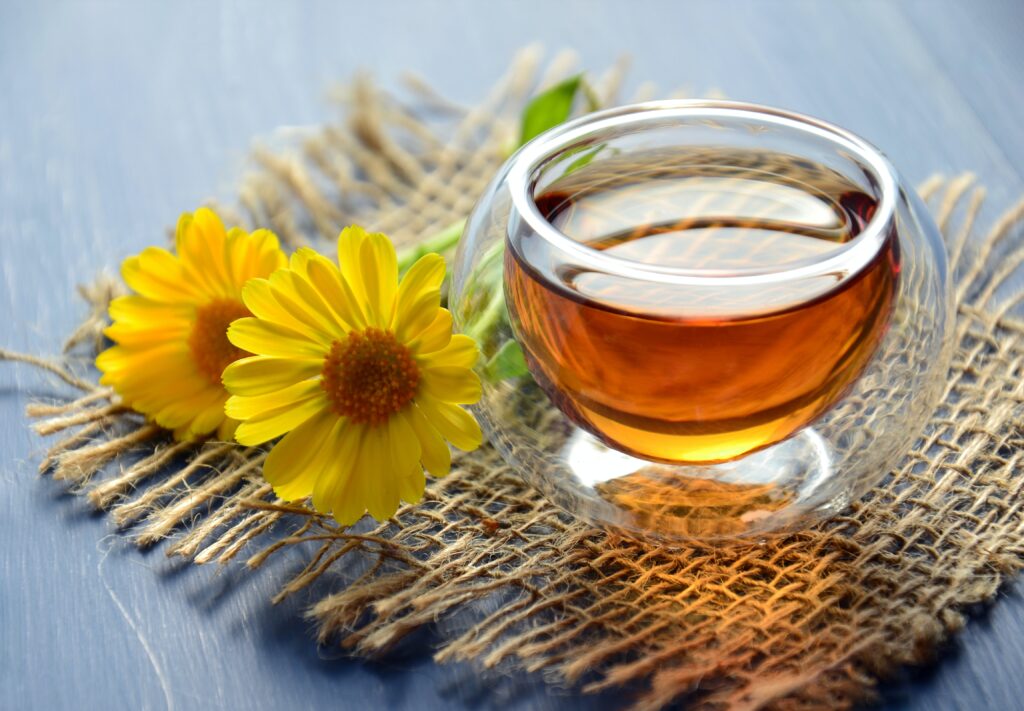Introduction of Garlic
When it comes to superfoods, garlic often takes center stage. This pungent bulb is renowned for its culinary prowess and impressive health benefits. While garlic is a common ingredient in many dishes, there’s another way to harness its goodness – through garlic tea.

In this blog, we’ll explore the world of garlic tea and its incredible health benefits.We will also explore how to make it, and some precautions to remember.
The Power of Garlic: A Brief Overview
Before delving into the specifics of garlic tea, let’s take a moment to understand why garlic is considered a nutritional powerhouse. Garlic contains essential nutrients, including vitamins C and B6, manganese, and selenium.
However, its true magic lies in a garlic called Allicin. Allicin is released when garlic is chopped. Allicin is known for its antibacterial, antifungal, and anti-inflammatory properties. It makes a valuable addition to your daily diet.
A Historical Treasure
Garlic’s use dates back thousands of years. It has been a part of various cultural and medicinal traditions worldwide. Ancient Egyptians believed in its protective properties, and it was even used as currency in Ancient Greece. Garlic’s rich history is a testament to its enduring importance.
Nutritional Powerhouse
Within each garlic bulb lies a treasure trove of nutrients. Garlic is rich in vitamins and minerals, with notable concentrations of vitamin C, vitamin B6, manganese, and selenium. This Allicin is responsible for many of garlic’s health benefits.
The Science Behind Allicin
Allicin is a bioactive compound that makes garlic unique. When garlic is damaged, such as through cutting or crushing, an enzyme called alliinase interacts with a precursor compound called alliin, converting it into Allicin.
Allicin is responsible for garlic’s distinct aroma and flavor, but it’s also a powerful medicinal compound with remarkable properties.
Medicinal Properties
Garlic is often celebrated for its medicinal properties. These include its antibacterial, antifungal, antiviral, and anti-inflammatory effects. Allicin and other sulfur compounds in garlic contribute to these properties, making it a valuable addition to natural remedies.
Culinary Versatility
Beyond its medicinal attributes, garlic is a culinary star. Its distinct flavor elevates dishes from various cuisines, adding depth and complexity to recipes. The culinary applications are endless, from garlic-infused olive oils to roasted garlic cloves.
Modern Scientific Research
Recent scientific studies have reaffirmed garlic’s health benefits. Research suggests garlic may help lower blood pressure, reduce cholesterol levels, and support cardiovascular health. It’s also being investigated for its potential in cancer prevention and as a natural immune booster.
The Versatility of Garlic in the Kitchen

Garlic’s versatility in the kitchen is a testament to its enduring popularity. From classic garlic bread to garlic-infused oils and savory soups, garlic is a culinary chameleon. Here, we’ll explore some creative ways to incorporate garlic into your cooking, showcasing its ability to transform ordinary dishes into extraordinary ones.
Garlic in Traditional Medicine
Traditional medical practices like Ayurveda and Traditional Chinese Medicine have long acknowledged the therapeutic benefits of garlic. These systems have taken advantage of garlic’s healing properties to treat conditions ranging from the common cold and flu to digestive problems and beyond.
Garlic Tea: An Ancient Remedy
Garlic tea is not a new invention; it has a long history of use in traditional medicine systems like Ayurveda and Traditional Chinese Medicine. For centuries, people have turned to garlic tea to alleviate various health issues, from the common cold to digestive problems.
Its versatility and effectiveness make it a go-to remedy for many. Garlic tea may not be as well-known as other herbal brews, but it has a time-honored place in traditional medicine systems across the globe. In this section, we’ll explore the origins of garlic tea and its historical significance.
Its role as a natural remedy for various health concerns.
Garlic tea-A Historical Elixir
Garlic tea has deep roots in traditional medicine practices. Its use can be traced back to ancient civilizations, including the Egyptians, Greeks, and Chinese. These cultures recognized garlic’s therapeutic potential, and infusing it into a warm beverage like tea became a revered tradition.
Ayurvedic Wisdom

Garlic has long been valued for its therapeutic powers in Ayurveda, the traditional Indian medical system. Garlic tea, known as “Lahasun Swarasa,” is often prescribed to balance doshas (body constitutions) and treat various ailments. Ayurvedic texts contain numerous references to the medicinal benefits of garlic and its preparations, including garlic tea.
Traditional Chinese Medicine (TCM)
In Traditional Chinese Medicine, garlic is considered “Suan Xiang” and is believed to have warming properties that can help dispel cold and dampness in the body. Garlic tea addresses respiratory infections and digestive complaints and supports overall vitality.
European Folk Medicine
Across Europe, garlic tea was a folk remedy for centuries. It was brewed to combat colds and flu, relieve digestive discomfort, and promote general wellness. Garlic’s antibacterial properties made it a go-to solution for infectious ailments when modern medicine was unavailable.
The Modern Resurgence
While garlic tea has a storied history, it’s experiencing a resurgence in popularity today. As interest in natural remedies and holistic health grows, many individuals are rediscovering the benefits of garlic tea. Modern research also highlights its potential as an immune booster and cardiovascular support.
In summary, garlic tea is a timeless elixir rooted in traditional medicine systems worldwide. Its historical significance and modern resurgence highlight it as a natural remedy. By understanding its origins, preparing it mindfully, and considering precautions, you can reap the benefits of this ancient and potent brew.
The Health Benefits of Garlic Tea
Garlic tea, with its unique combination of Allicin and other beneficial compounds, offers a range of health advantages that make it a valuable addition to your wellness routine. Let’s explore these benefits in detail:
Support Immune System
Garlic tea is celebrated for its immune-boosting properties. Garlic’s main ingredient, Allicin, has been demonstrated to promote the development of white blood cells, essential for treating infections. Regular consumption of garlic tea can help your body defend against common illnesses and diseases.
Enhance Heart Health
One of the standout benefits of garlic tea is its potential to support heart health:
- Blood Pressure Regulation Garlic contains compounds that help relax blood vessels, lowering blood pressure levels. This effect may reduce the risk of hypertension and related heart problems.
- Cholesterol Reduction Studies suggest garlic may lower LDL cholesterol levels, often called “bad” cholesterol. Heart disease risk is reduced by having lower LDL levels.
- Antioxidant Protection Garlic’s antioxidant properties can help protect the heart and blood vessels from oxidative stress and inflammation.
Digestive Health
Garlic tea can be soothing for the digestive system:
- Digestive Aid: It has been used traditionally to alleviate various digestive issues, including bloating and indigestion. The compounds in garlic may help improve overall gut health.
- Antibacterial Properties: Garlic’s antibacterial properties can combat harmful bacteria in the digestive tract, potentially reducing the risk of infections.
Antioxidant Powerhouse
Garlic is a potent source of antioxidants essential for combating free radicals and preventing cell damage. Antioxidants in garlic tea may contribute to a reduced risk of chronic diseases, including certain types of cancer.
Respiratory Health
Garlic tea can provide relief for respiratory issues:
- Cold and Flu Symptom Alleviation: Its antimicrobial properties may help ease common cold and flu symptoms, including congestion and sore throat.
- Asthma Support: Some studies suggest that garlic may positively impact asthma symptoms due to its anti-inflammatory properties.
Anti-Inflammatory Effects
Chronic inflammation is a contributing factor to various diseases. Garlic tea’s anti-inflammatory properties may help reduce inflammation, making it potentially beneficial for conditions like arthritis and inflammatory bowel diseases.
Potential Cancer Prevention
While research is ongoing, some studies suggest that garlic’s antioxidant properties and sulfur compounds may play a role in cancer prevention. It may help reduce the risk of certain types of cancer, especially those related to the digestive system.
Blood Sugar Management
Emerging research indicates that garlic may positively impact blood sugar levels. It may help regulate insulin sensitivity and reduce the risk of type 2 diabetes.
Mental Well-Being
Garlic contains compounds that may support mental health. Some studies suggest it positively impacts mood and cognitive function.
Incorporating garlic tea into your daily routine can be a flavorful way to tap into these health benefits. However, it’s important to remember that garlic tea does not replace professional medical advice and treatment. If you have specific health concerns or are taking medications, consult a healthcare professional before significantly changing your diet or wellness routine.
How to Make Garlic Tea
Making garlic tea is simple. Here’s a basic recipe to get you started:
Ingredients:
- 2-3 garlic cloves (peeled and crushed)
- 1 cup of water
- Optional: honey, lemon, or ginger for added flavor
Instructions
- Boil the water in a saucepan.
- Add the crushed garlic cloves to the boiling water.
- Allow it to simmer for 10-15 minutes.
- Remove from heat and strain the tea into a cup.
- Add honey, lemon, or ginger if desired for flavor.
- Enjoy your garlic tea while it’s warm.
Precautions and Considerations
While garlic tea offers numerous health benefits, there are some precautions to keep in mind:
- Garlic Breath: Garlic is notorious for causing bad breath. Consider this if you have social engagements after consuming garlic tea.
- Medication Interactions: If you are taking medication or have underlying health conditions, consult with a healthcare professional before incorporating garlic tea into your routine, as it may interact with certain medications.
- Digestive Sensitivity: Some individuals may experience digestive discomfort or heartburn from garlic. Start with a small amount and monitor your body’s response.
- Allergies: Garlic allergies are rare but possible. If you suspect an allergy, discontinue use and seek medical advice.
Conclusion
Garlic tea is more than just a flavorful brew; it’s a potent elixir for overall well-being. This ancient remedy offers many benefits, from bolstering your immune system to supporting heart health. By incorporating garlic tea into your daily routine, you can harness the power of garlic and take a step towards a healthier, more vibrant life. So why brew a cup today and toast to your health with the aromatic goodness of garlic tea?
